Advanced Energy Saving and its Applications in Industry
ebook ∣ SpringerBriefs in Applied Sciences and Technology
By Kazuo Matsuda

Sign up to save your library
With an OverDrive account, you can save your favorite libraries for at-a-glance information about availability. Find out more about OverDrive accounts.
Find this title in Libby, the library reading app by OverDrive.



Search for a digital library with this title
Title found at these libraries:
| Loading... |
The conventional approach for energy saving in a process system is to maximize heat recovery without changing any process conditions by using pinch technology. "Self-heat recuperation technology" was developed to achieve further energy saving in the process system by eliminating the necessity for any external heat input, such as firing or imported steam. Advanced Energy Saving and its Applications in Industry introduces the concept of self-heat recuperation and the application of such technology to a wide range of processes from heavy chemical complexes to other processes such as drying and gas separation processes, which require heating and cooling during operation.
Conventional energy saving items in a utility system are applied and implemented based on a single site approach, however, when looking at heavy chemical complexes, it was apparent that the low-grade heat discharged as waste from a refinery could also be used in an adjacent petrochemical plant. There could therefore be a large energy saving potential by utilizing the surplus heat across the sites. Advanced Energy Saving and its Applications in Industry assesses conventional approaches to industrial energy saving and explains and outlines new methods to provide even greater energy saving potential.
Advanced Energy Saving and its Applications in Industry provides a key resource and research tool for all those involved in developing the energy efficiency of industrial processes. Researchers, industry professionals and even students with an interest in green engineering will find the summaries of the conventional and suggested new methods useful when attempting to advance further development within this field.






